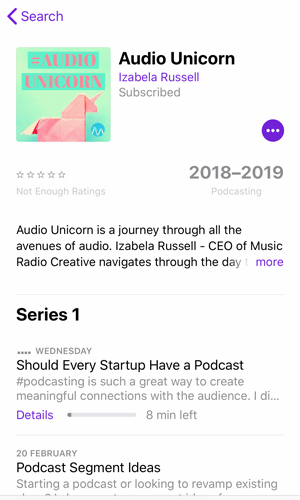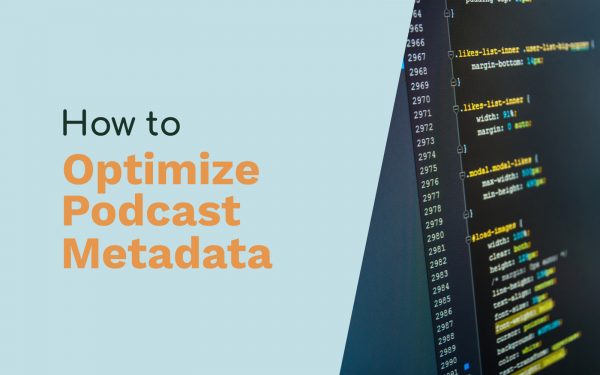What is Metadata?
In simple terms this is the front of the house. Your front door, porch, front bit of a garden and so on. In podcasting terms this is your episode title and description, show name and podcaster details. Anything that is visible to a potential listener up front before they click play or “read more”. This is everything that a potential listener will see and judge whether to hover their finger and eventually listen and subscribe. So kind of a big deal if you ask me! On the left here is a screenshot of my podcast Audio Unicorn – as you can see each podcast title and first 100 characters of description is what shows up. This along with a podcast name and description is my front door.

Dos and Don’ts of Podcast Metadata
In Feb 2019 Apple has released their official guide for podcasters to follow when it comes to submitting your podcast to Apple Podcasts. Below is the summary of their recommendations or rather – things you should avoid when it comes to metadata:
1. Including placeholder text from your hosting provider. For example, descriptions such as “Podcast by author name,” “New podcast weblog,” “Cover art photo provided by name,” or “Description goes here.”
In other words – don’t be lazy and leave any fields that are given empty!
2. Verbatim repetition of the title or author name in the description. For example, “The Very Hungry Tourists by Dr. María Sánchez and John Appleseed.”
Whilst it can be tempting to simply do a copy paste job – make sure to create a unique description for each episode you publish. It doesn’t have to be long – in reality first 100 characters is what counts most so you can keep it very brief if your creative juices are not flowing.
3. Incorporating irrelevant content or spam. For example, show titles like “The Very Hungry Tourists | Travel | Explore | Learn” or author names like “Dr. María Sánchez, coach and travel enthusiast.”
This is not a keyword game and Apple is very clear here. Whilst it perhaps worked a few years back – now you can’t just throw random keywords in description hoping it will show in most search results for all those you included.
4. Adding episode numbers in titles. For example, show titles like “The Very Hungry Tourists Episode 01” or episode titles like “01 Broken Heirloom.”
This rattled a bit of a shock in a podcasting community. I must admind that this point meant also some work for me personally. Thousands of podcasters use podcast numbers in their titles and now it’s clear that this wasn’t a clever practice after all. I guess from the listener point of view the numbers don’t add any credibility or value – so why trash the precious space?
Why You Can’t Afford To Get Metadata Wrong
You might be tempted to think that this doesn’t matter that much and you can get away with existing practices. In the same update email Apple is clear with the users that “High-quality metadata can help your show be discovered and grow your audience, as it ultimately determines whether it appears in relevant user searches. Conversely, poor-quality podcast metadata may affect new submissions as well as active shows to ensure our platform meets Apple’s quality standards.”
In other words – if you are serious about podcasting – metadata is not something you should be brushing to a side.
How to Add Metadata to Your Podcast?
Metadata is glued on to the mp3 recording of your podcast. You add it into the mp3 after all the post processing has been done. If you use Adobe Audition to edit your podcast – Metadata is natively baked in and in a few clicks you can add all relevant information (see image below for details).
Most of the other major podcast editing tools have this option baked in too. Each looks slightly different and has variety of fields that can send any sane person mad. I recommend focusing on the fields that do matter for a podcast usage. More about those shortly.
Metadata vs ID3 Tags
Effectively we are talking about the same things here. ID3 tags contain metadata most often used with the mp3 audio file format. It allows information such as the title, artist, album, track number, and other information about the file to be stored in the file itself. When you then submit your podcast to various podcatches that data is then read by them and displayed to the potential audience. So in a nutshell it’s a bunch of text written and saved inside your episode file that can then be extracted on demand? Not so complex after all!
Which Tags Are Relevant To Podcasters?
ID3 tags have been around long before the word “podcast” was first spoken! No surprise here then that some of the tags available are actually not relevant to podcasts (or to any kind of content we create today!). I wish there was an update to the industry standard that took into account all the changes we have seen in the last decade in files and platforms we use (I still fondly remember the Winamp days!). The ID3 tags you should include in your podcast:
Essential
– Title (this is individual episode title).
– Comments/Description (this is your short episode summary – as you can see in iTunes only the first 100 charachters gets shown up front befre disapearing behind …, in Stitcher you have to click into the episode to see the description).
Non-essential
I say it’s not essential because hopefully this information is already captured in your podcast description and setup inside Podcast Connect and your podcast host. Saying this however I would personally not release my podcast without this information baked into the mp3 file.
– Artist (usually a name of a podcast host).
– Album (your podcast name).
– Composer (podcast host or a production company).
– Orig. Artist (podcast host or organisation).
– Artwork/Pictures – this is either your overall podcast artwork or if you create individual artwork for each episode this is the place to add it.
Other
Other fields often seen inside various editors:
– Track number – this could be an episode number – although I find this irrelevant with a host like Anchor who will automatically number your episodes for you anyway.
– URL – in all honesty I don’t even know where this information is displayed? If you know – please let me know I will happily update the article – I have experimented with my own podcast to see where I can find that piece of metadata and I had no luck.
– Year
– Genre (more relevant to music than podcasts but there is genre called Podcast so you can use that!).
– Copyright
ID3 Editor
I have been using this rather hugely outdated piece of software for a while now. I would likely not use it at all if not the fact that a couple of our clients insist on using it in their tags. With time I got used to it and even like it as it complies with the latest agreed standard on ID3 tags – in other words I can trust that it does the job well! Initially massively overwhelming but with time you get used to all it has to offer. ID3 Editor costs $15 to license (a one off payment). It brings together all of the metadata available into one place. Here is ID3 Editor in action:
I only ever use the ID3 v2 Standard (which is a newer standard to V1 and the one you need to use as it’s compatible with all the new platforms such as Apple Podcasts, Stitcher, Spotify etc). There is an extended field (see below) – but the information in there is not relevant to podcasts so again – you can miss that entirely.
The extended section called “Podcast” gives you an opportunity to mark the tag as a podcast. I don’t think it matters greatly if you do or don’t do that – as again a reminder here – this piece of software has been created in the world before Apple Podcast was even a thing. My understanding and research into this indicates that this feature will mark the file as a podcast and when presented on a hard drive will group them into one folder (when you search for specific files on your hard drive – you could search for mp3 files that are podcasts – this would group them together).
Quality Matters
In a nutshell ID3 tags and metadata can be overwhelming at first. What we need to understand however is that they are there to help filter through masses of content that’s uploaded to the internet daily. They make our files searchable and the better we do our job at adding them – the easier it will be for our potential listeners to find us. Apple has shown us that they pay attention to quality and in my personal opinion this will be the first area of many that will come under review in the coming months. As podcasters we should adhere to create great quality content and perhaps the times where we can just “throw it out there and see if it sticks” are approaching it’s end. Podcasting doesn’t fall under any regulations currently. Unlike radio you are free to create the content how you wish with no big corporation breathing down your neck. Is this the start of a new quality era for podcasting? Time will tell…
If you are considering podcasting or have just started you may be interested in the other posts in our “Start with podcasting” series.
